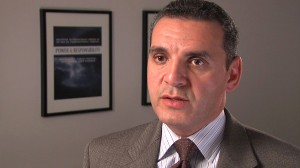UMW’s Campus Academic Resources Committee and the Department of Political Science and International Affairs invite you to a lecture by Khaled Elgindy. His talk, titled “America and the Paradoxes of Palestinian-Israeli Peace,” will be held Wednesday, April 9 at 7 p.m. in Lee Hall, Room 411.
Khaled Elgindy is a Fellow with the Saban Center for Middle East Policy at the Brookings Institution, where he specializes in Palestinian politics and the Israeli-Palestinian conflict. He previously served as an advisor to the Palestinian leadership in Ramallah on permanent status negotiations with Israel from 2004 to 2009, and was a key participant in the Annapolis negotiations that began in November 2007. Prior to that Elgindy spent nine years in various political and policy-related positions in Washington, D.C., both inside and outside the federal government, including as a professional staff member on the House International Relations Committee in 2002 and as a policy analyst for the U.S. Commission on International Religious Freedom (USCIRF) from 2000 to 2002. He has also held positions at the Arab American Institute (1998-2000) and the National Democratic Institute for International Affairs (1995-1997). Elgindy holds an M.A. in Arab Studies from Georgetown University and a B.A. in Political Science from Indiana University.
